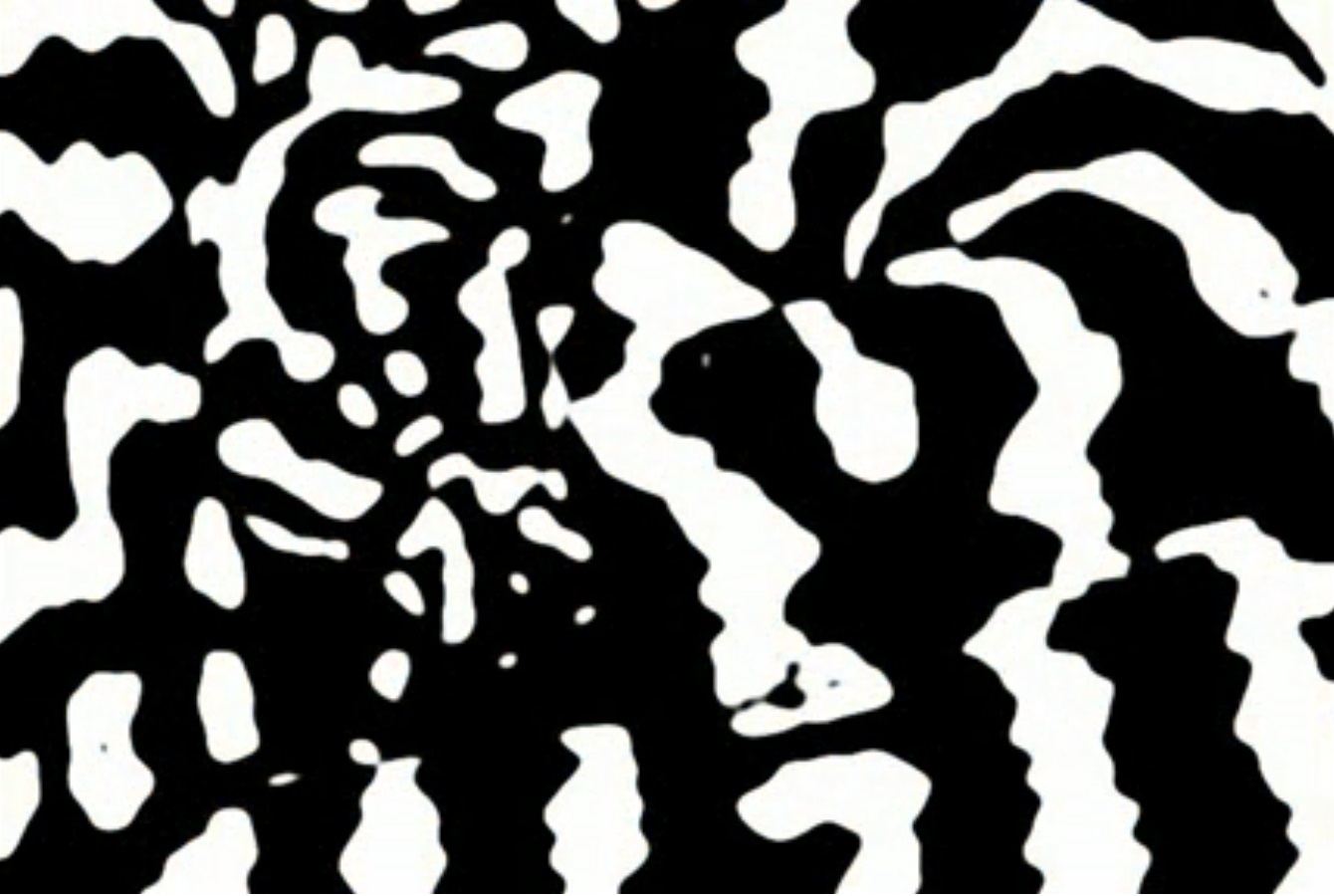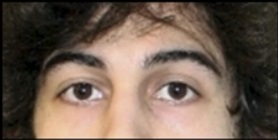
. , , - , - . , , , , : « ?» « ?», « ?» . - , , « ».
Report by Lisa Feldman Barrett (Ph.D., professor of psychology at Northeast University in Boston), after which you will see == spoiler == in this picture and you will never be able to see it.
My laboratory is a couple of kilometers from the site of the bombings at the 2013 Boston Marathon. The surviving demoman, Dzhokhar Tsarnaev from Chechnya, was convicted and sentenced to death.
In general, when jurors choose between life imprisonment and the death penalty, they are usually based on whether the defendant repents of his actions. Tsarnaev apologized, but when the jury looked at him, they saw only a stone face.

Yes, Tsarnaev is guilty, there is no doubt about that. He killed and crippled innocent people, and I am not going to dispute this. My heart is full of sympathy for the victims. But as a scientist, I must say that the jury, in principle, cannot recognize remorse or any other emotion from anyone. Neither I nor any of you are capable of this, and all because emotions are not what we think. They have no universal way of expressing and defining. These are reactions that are not programmed in the brain and cannot be controlled. We have been confused about the very nature of emotions for a very long time. And understanding the true nature of emotions has important consequences for all of us.
I have been studying emotions scientifically for 25 years. In the laboratory, we examined the faces of people by measuring electrical impulses, due to which the facial muscles contract and change facial expression. We have carefully observed the human body in the context of emotions. We analyzed hundreds of physiology studies in which thousands of subjects participated. We have scanned the brains of hundreds of people and analyzed all the research on emotion visualization published over the past 20 years. And the results of all these studies are mostly the same. It may seem to you that your emotions are programmed and activated independently of you, but they are not. You may believe that your brain has some kind of emotional circuitry, that you are born with a specific set of emotions, but you are not.In fact, none of those present has ready-made emotional patterns in the brain. And not one brain on Earth has ready-made emotional patterns.
So what are emotions, really? So, fasten your seat belts, because ... Emotions are assumptions. These are the guesses your brain constructs as billions of cells interact with each other, and you have more control over those guesses than you might imagine.
If you think this sounds ridiculous or wild, then I understand you, because, frankly, if I hadn’t seen the evidence myself, dozens of years of evidence myself, I’m quite sure that I myself would not have believed it. But the bottom line is that emotions are not built into our brain at birth. They are created there.
To see what I mean, take a look here. Right now, your brain is going crazy. Your neurons are fired up to make it meaningful so that you see something other than just black and white blots. Your brain analyzes experiences throughout your life, simultaneously making thousands of assumptions, weighing their probabilities, trying to answer the question, "What is it most like?" Not “What is it?”, But specifically “What does it most resemble from all my past experience?” And all this happens in the blink of an eye. If your brain is still trying to find a suitable comparison and you still see black and white spots, then you are in a state called "experiential blindness." And now I will heal you from this blindness. This is my favorite part. Are you ready for healing?
So. Here it is


That's it. So, now many of you are seeing a snake, why? Because while your brain goes through all the past experience, it discovers new knowledge - the knowledge that you received from photography. And it's actually great that the knowledge you received just a moment ago influences how you perceive these blots now.

So your brain creates an image of a snake where there is no snake, and this kind of hallucination is what neuroscientists like me call "guessing."
Assumptions are, in fact, how the brain works. This is his usual business. Assumptions are the foundation of every experience you gain. This is the foundation of every action you take. Actually, guesswork allows you to understand the words that I say as I open ...
Audience: Mouth.
Mouth. That's it. Assumptions are paramount. They help us make sense of the world quickly and efficiently. Your brain does not respond to the outside world. Using the experience of the past, it assumes and creates your experience of perceiving the world around you.

How we see emotions in other people is rooted in assumptions. It seems to us that we are just looking at someone's face and deciphering facial expressions, as if we are reading words written on paper. But in reality, in your skull, your brain is only making assumptions. He uses past experiences based on similar situations to try to give meaning. In this case, you are not extracting meaning from the blots, you are extracting meaning from facial expressions, such as bending the lips or raised eyebrows.

And this insensible look? It may be a merciless killer, but such a view may also mean that a person stoically accepts defeat, which is actually one of the postulates of Chechen culture, as in the case of Dzhokhar Tsarnaev.
The essence of this lesson is that the emotions that you think you see in other people actually partially reflect what you have in your head. This is characteristic of the courtroom, but the same thing happens in the school, in the bedroom, and in the boardroom.
And here's what worries me: IT companies that should remain anonymous ... or maybe not. You know, Google, Facebook ... spending millions of dollars on research to create emotion detectors, asking the root of the wrong question, as they're trying to detect emotions in the face and body when emotions aren't there. Physical movements by themselves have no emotional message. We ourselves must breathe meaning into them. The person or anyone else has to connect them to the context, and that is what gives them meaning. That is why we know that a smile can mean sadness, tears can be due to joy, and a courageous, motionless face can mean that a person is maliciously thinking over the death of his enemy.
And now, if I have not gone too far, I want to risk a little more and say that the way you experience your own emotions happens in exactly the same way. In fact, the brain makes assumptions, guesses, which it builds on the fly with the help of billions of neurons working simultaneously.
Yes, the brain is initially able to perceive sensations, elementary feelings, going back to the physiology of the body. So at birth, you are able to feel calm and excitement, excitement, comfort, inconvenience. But these elementary feelings are not emotions. They are actually with you at every conscious moment of life. These are simple messages about what's going on in your body, something like an indicator. But they are uninformative, and you need the details to know what to do next.
What to do with these feelings? How does your brain present these very details? Well ... assumptions are just about that. Assumptions connect the sensations of your body, which give you elementary feelings, to what is happening in the world around you so that you know what to do. And sometimes these add-ons are emotions.
For example, you are going to go to the bakery, your brain may assume that you will come across an excellent aroma of freshly baked chocolate chip cookies. I know my brain would guess the aroma of fresh chocolate chip cookies. And the brain can make the stomach growl a little, preparing to eat this cookie itself. And if we were not mistaken, if the cookies were really just taken out of the oven, the brain will create what we call hunger, and we will be ready to pounce on these cookies and digest them very efficiently, that is, we can eat a lot, which would be very helpful.
You laugh a little. I speak absolutely seriously.
But here's the thing. This rumbling stomach, if it happens in a different situation, can have a completely different meaning. If your brain had to predict a rumbling belly, for example, in a hospital, while you are waiting for test results, in this case, the brain would create fear, or excitement, or anxiety, and this could cause you, for example, wring your hands or deeply sigh or even cry. It is so? The same physical sensations, the same rumbling of the stomach, but a different experience.
A lesson can be learned from this: the emotions that seem to happen to you are actually created by you. You are not at the mercy of an imaginary cycle of emotions that is supposedly buried deep in ancient parts of your brain. You control your emotions much more than you think. I'm not saying you can snap your fingers and change how you feel as if you were changing clothes, but your brain is equipped so that if you change the building blocks that your brain uses to create emotion, you can change your emotional life. ... Therefore, if you change these elements today, then you will practically teach your brain to think differently tomorrow, and this is what I call "to be the architect of my experience."
Here's an example. We were all nervous before the test, right? But some people experience paralyzing anxiety before work. They have test anxiety. Based on past experiences with writing tests, their brains predict a rapid heartbeat, sweaty palms, and these are sensations so intense that they ultimately cannot complete the test. They can’t cope and sometimes not only get “bad”, but they can fly out of college. But here's the thing: heart palpitations aren't necessarily anxiety. This can mean that the body is preparing to fight and pass this test as "excellent" or, say, give a speech in front of a hundred people, on stage, where you are also filmed.
I'm serious.
Research shows that when students are trained to make such activated decisions instead of anxiety, they do better on tests. And that determination forces their brains to make different assumptions in the future so that they don't get confused when creating emotions. And if they do this often enough, then not only will they pass the test successfully, but it will be easier for them to close this course, and they can even graduate from college, which will greatly affect their future potential earnings. Therefore, I call this emotional intelligence to action.
Now you can develop this emotional knowledge yourself and use it in your daily life. So just, let's say, imagine waking up in the morning. I'm sure you've experienced this. I am. You wake up and while trying to regain consciousness, you feel terrible fear, you know, real hopelessness, and instantly your mind begins active work. You start thinking about all the shit that needs to be done at work, and you also have mountains of emails that you will never get out of, calls that need to be answered, an important meeting on the other side of town, and you have to be in a traffic jam, you are not will have time to pick up the children, your dog is sick, and what should you cook for dinner? Oh my God. What kind of life do you have? What kind of life do I have?
This race of reason is speculation. Your brain is trying to find an explanation for the sensations in your body that you perceive as hopelessness, just like in the case of the image of blots. Your brain is trying to give an explanation of what made you feel so that you know what to do with them. But these feelings may not be an indicator that something is wrong in your life. They may have a purely physical reason. You may be tired. Maybe you did not sleep. Maybe you are hungry. You may be dehydrated. Next time, when you will be so confused, ask yourself: “Could this be purely for physical reasons?” "Is it possible to translate emotional distress into a little physical discomfort?"
I am not offering you any Jedi brain tricks to deal with your depression, or anxiety, or other serious condition. But I say that you control your emotions more than you can imagine, and that you have the ability to move arrows from emotional experiences and their impact on your life, learning how to create experience in a different way. All of us are capable of this, and with a little practice we can succeed in it, like in driving: initially it takes a lot of effort, but in the end it becomes almost unconscious.
I don’t know about you, but I find it truly inspiring and inspiring, and the fact that this has been confirmed by decades of research also pleases me as a scientist. But I must warn you that the important is often overlooked, because more control also means more responsibility. If you are not subject to imaginary emotional patterns that supposedly are somewhere deep in the brain and work without the participation of consciousness, then who is responsible? Who is to blame when you misbehave? You. Not because you are to blame for your emotions, but because the actions and experiences you gain today become brain assumptions tomorrow. Sometimes we are responsible for something, not because it is our fault, but because only we are able to change it.
Responsibility is a big word. It is so loud, in fact, that sometimes people feel the need to resist scientific evidence that emotions are built, not built in. The idea that we are responsible for our emotions seems difficult to digest. But I suggest you not choke on her. Just take a deep breath, grab a glass of water if needed, and then take it. Accept this responsibility because it is the path to a healthier body, a fairer and more informed legal system, and a more flexible and strong emotional life.
Thank.
Read more
- Our knowledge of emotions will have to be rethought (Lisa Feldman Barrett)
- What is the power of emotions?
- Marvin Minsky "The Emotion Machine"
Subscribe to channels:
- @Ontol is a github for articles / videos that have influenced / shaped the worldview
- @META LEARNING - about how IT / games will change the approach to (self) education. And also thoughts on this topic by Anton Makarenko, Gregory Bateson, Seymour Papert, Paul Graham, Joseph Licklider, Alan Kay)
What are your most interesting findings (articles / videos) about "emotions"?